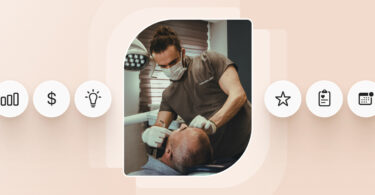Healthcare marketing challenges in 2026 are more complicated and urgent than ever before. From strict compliance and data security to shifting patient expectations and the rise of AI-driven platforms, the healthcare marketing industry is undergoing a profound transformation at every level.
Marketing efforts that once worked, like direct mail or display ads, are now underperforming. Earning trust is harder. Maintaining visibility is more competitive. Patients expect healthcare providers to deliver personalized experiences while remaining compliant with the Health Insurance Portability and Accountability Act (HIPAA).
In fact, according to Birdeye’s 2025 State of Online Reviews, over 81% of reviews are now posted on Google, making online reviews a vital component of modern healthcare strategy.
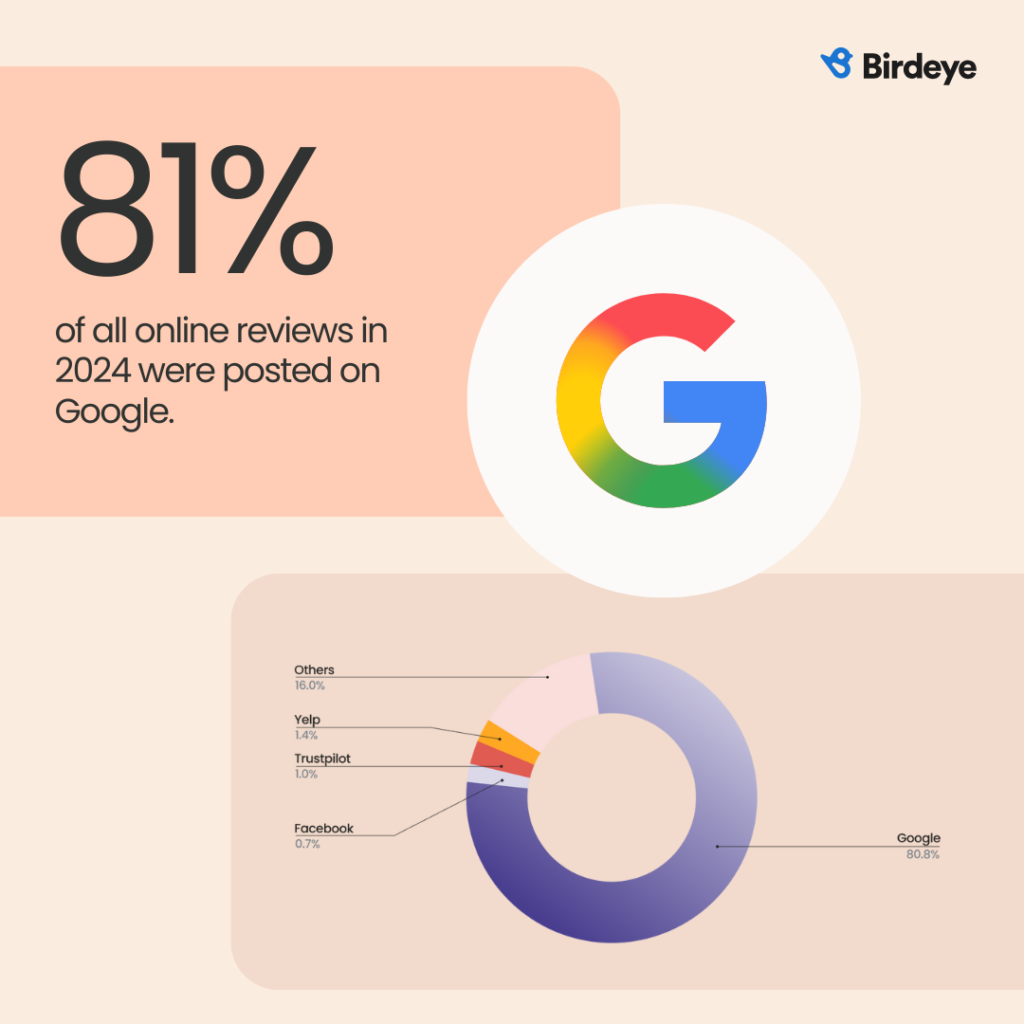
So, how do you keep up? In this blog, we’ll break down the key healthcare marketing challenges you’ll face in 2026, why traditional tactics no longer work, and how you can use GenAI to reach the right direction in your marketing strategies.
Table of contents
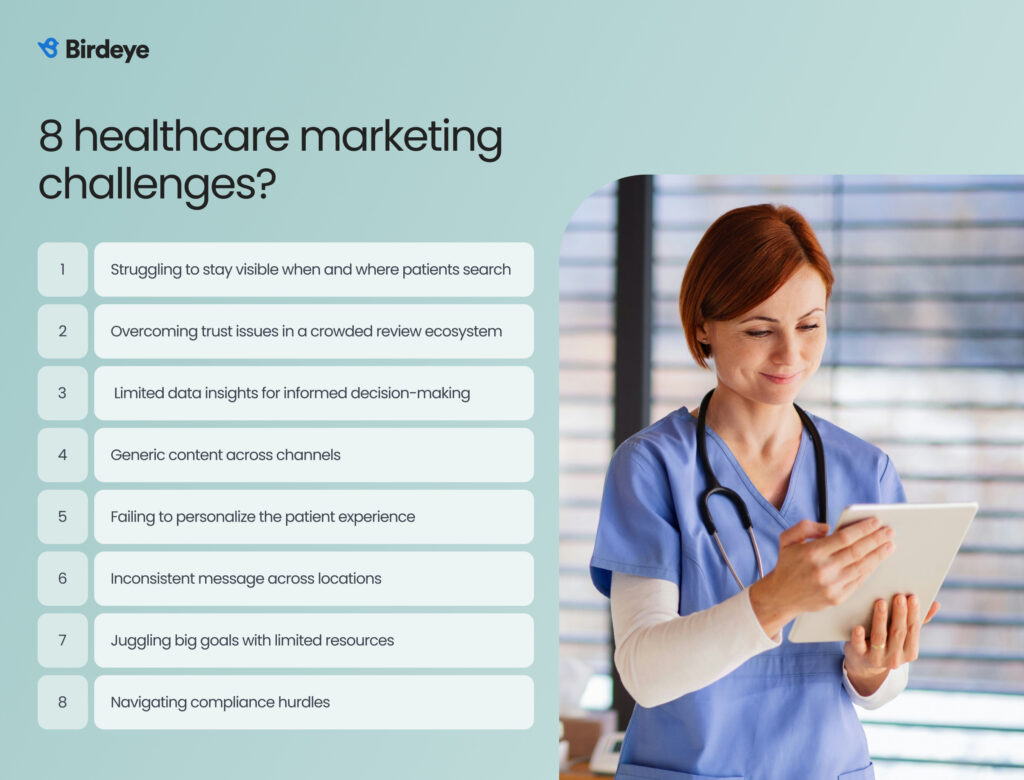
What makes healthcare marketing so complex?
Despite massive growth in digital marketing tools, the marketing challenges in the healthcare industry remain deeply rooted in structural, regulatory, and ethical barriers. Whether you’re targeting new patients, building a healthcare brand, or coordinating across multi-location systems, the complexity of healthcare stems from its unique and highly regulated nature.
For healthcare marketers, it’s not just about generating leads; it’s about ensuring explicit consent, delivering informative content, and protecting patient privacy while maintaining marketing that is both measurable and scalable. Add to this the rise of AI in marketing and evolving digital platforms, and the job becomes more demanding for both B2C (mainly hospitals and clinics) and B2B (healthtech companies and medical suppliers) healthcare marketing teams.
Let’s also not forget the sheer diversity of roles and stakeholders, from healthcare professionals to insurers, admin teams, and marketers, all trying to shape the patient journey. Balancing these dynamics while maintaining marketing that is measurable, ethical, and scalable is what makes healthcare marketing complex.
Why traditional marketing tactics are falling short
Traditional marketing can’t keep up with today’s dynamic healthcare environment. Patients demand personalized, digital-first experiences, while healthcare organizations face growing compliance pressures and intense competition.
That’s where many healthcare marketing challenges begin.
Tactics like cold emails, static landing pages, and generic ads may have worked a decade ago, but they no longer resonate with today’s target audience.
Today’s healthcare consumers expect:
- Personalized content that speaks directly to their condition, location, and goals
- Real-time responses across digital touchpoints
- Valuable, trustworthy information, especially in sensitive areas like mental health
- Seamless digital experiences from scheduling to reviews to follow-ups
- Consistent service quality, both online and offline.
And with increased competition in every specialty, standing out means going beyond the basics. It requires a thorough understanding of what matters most to your audience: convenience, transparency, and trust.
The truth? Modern marketing in healthcare isn’t just about attracting new patients—it’s about earning their loyalty. The organization that chooses innovation over inertia gains a lasting competitive advantage.
Let’s look at the 8 top healthcare marketing challenges faced by this industry:
8 healthcare marketing challenges and how to solve them
The following eight are what healthcare marketing teams struggle with the most, and how modern tools like Birdeye can help fix them.
Challenge 1: Struggling to stay visible when and where patients search
Even the most innovative healthcare marketing efforts fall flat if potential patients can’t find you online. Many healthcare organizations still rely on outdated directories, inconsistent business listings, and low-performing digital platforms.
Today’s patients expect up-to-date profiles, clear service descriptions, and accurate location data. If even one listing is incorrect, it can cost you credibility and conversions.
To stay visible, healthcare marketers are embracing platforms that sync and update listings across the web. Birdeye Listings AI ensures your profiles on Google, Facebook, and other digital advertising and marketing channels are complete, up-to-date, and geo-optimized across all your service lines.
Challenge 2: Overcoming trust issues in a crowded review ecosystem
Trust is the new currency in the healthcare marketing industry. And today, online reviews are often more influential than provider credentials.
But collecting reviews consistently is hard. So, it’s about responding quickly across locations and knowing what feedback is worth acting on.
To overcome this, teams are automating review requests post-visit and using AI tools to summarize themes from reviews and surveys. This helps healthcare providers not just gather feedback but use it to improve patient experience, while ensuring privacy and compliance.
Birdeye Reviews AI automates review requests, manages responses, and uncovers trends in patient experience, turning one-time feedback into data-backed action.
This helps healthcare providers and healthcare professionals increase patient satisfaction while maintaining compliance.
Challenge 3: Limited data insights for informed decision-making
Legacy dashboards and spreadsheets simply can’t keep pace with the data flow in modern healthcare.
Whether you’re a hospital system or a specialty clinic, understanding what patients are saying and how they’re behaving is vital for shaping smarter marketing strategies.
The most advanced healthcare marketing automation platforms now integrate patient data from reviews, chats, and surveys, turning it into data-driven insights you can act on. This enables sharper targeting, better messaging, and stronger outcomes across campaigns.
Birdeye Insights AI analyzes patient data across reviews, surveys, and support channels to generate reports that drive effective marketing campaigns.
Challenge 4: Generic content across channels
Healthcare professionals walk a fine line: provide useful, engaging content while maintaining HIPAA compliance, avoiding overpromises, and respecting consent boundaries.
The result? Many teams end up playing it too safe, producing generic social posts and underwhelming patient communications.
Birdeye Social AI creates platform-ready posts aligned with your healthcare brand, scheduling them with ease for multiple locations while ensuring effective communication. It empowers many marketers who struggle to create compliant yet human content at scale.
With AI-generated content now powering much of digital healthcare, the best organizations are investing in solutions trained on healthcare content, designed to align with strict adherence to industry rules, without sounding robotic or off-brand.
Challenge 5: Failing to personalize the patient experience
Modern patients expect personalized engagement across search, social, and scheduling, but delivering that at scale is one of the biggest challenges in healthcare today.
Generic outreach no longer resonates. Patients want tailored interactions based on needs, location, and behavior.
Smart healthcare digital marketing teams are investing in automation that learns from reviews, location-specific feedback, and prior visits to customize every interaction. This enhances patient trust and guides them through the full patient journey with ease.
Challenge 6: Inconsistent messaging across multiple locations
In large, multi-location networks, consistency becomes a silent killer. One office posts a polished campaign while another shares outdated content or worse, off-brand messaging.
This inconsistency weakens your healthcare brand, confuses your target audience, and disrupts the patient acquisition journey. In a crowded healthcare landscape, brand inconsistency leads to lost trust and poor brand recall.
To fix this, healthcare marketing teams are adopting content tools that help ensure uniform tone, voice, and visuals, regardless of who’s creating the marketing content.
The most effective teams use centralized AI tools trained on healthcare compliance rules to ensure compliance and protect service quality.
Birdeye Brand AI and Industry AI are trained on healthcare-specific content, ensuring messages are both accurate and aligned with strict adherence to industry standards.
Challenge 7: Juggling big goals with limited resources
Most healthcare marketers today wear multiple hats. They manage local pages, reply to reviews, run digital ads, analyze results, and more, often with limited budgets and lean staff.
This scramble spreads marketing efforts too thin. And as new healthcare marketing trends and technologies emerge, the complexity only grows.
What’s working? Centralized tools that combine listings, reviews, surveys, and social publishing into one system, reducing overhead and freeing up time for high-impact work. With better workflows, even small teams can achieve maximum impact across multiple marketing channels.
Challenge 8. Navigating compliance hurdles
As healthcare goes more digital, so do its risks. From Google updates to privacy laws, the cost of missteps is rising.
Health-related ads, website forms, and appointment requests, every interaction must meet standards for HIPAA guidelines, health insurance portability, and patient data security. That includes handling protected health information responsibly.
One careless ad, unapproved social post, or outdated disclaimer could lead to fines, takedowns, or reputational damage.
To stay protected, more healthcare organizations are turning to tech that supports explicit consent, monitors copy for compliance, and ensures every post or campaign meets the bar. It’s about building trust through transparency, backed by systems that reduce the margin of error.
The best tools don’t just enable compliance—they simplify it.
8 Healthcare Marketing Challenges You Need to Know
Want to see the impact of Birdeye on your business? Watch the Free Demo Now.
How Birdeye GenAI helps solve healthcare marketing challenges
The truth is, many healthcare marketing challenges in 2026 can’t be solved with more spend or more staff. The real fix lies in scalable, intelligent systems that can keep up with the speed, complexity, and compliance demands of the modern healthcare industry.
That’s where Birdeye GenAI comes in.
Purpose-built for healthcare, Birdeye’s platform brings together listings, reviews, social content, surveys, referral and insights into one unified system powered by GenAI models that are custom-trained for your industry.
Whether you’re tackling B2B healthcare marketing challenges (like maintaining brand voice across regional sales teams) or consumer-facing growth campaigns, Birdeye’s dual-stack AI—Brand AI and Industry AI adapts to your unique workflows, tone, and compliance needs.
Let’s look at how each tool directly addresses the challenges of healthcare marketing:
Listings AI
Keeps your business profiles updated across Google, Facebook, Apple, and 150+ sites—improving local SEO, reducing inconsistencies, and helping multi-location healthcare organizations stay discoverable.
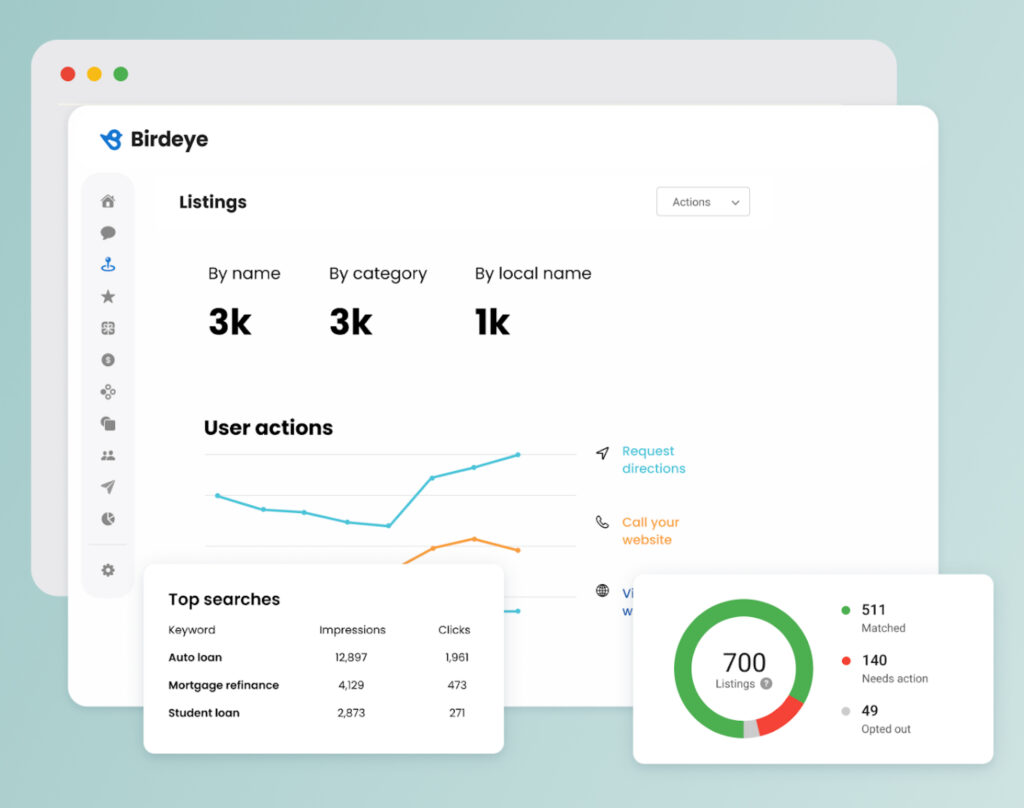
Reviews AI
Automates review generation, analyzes feedback, and detects patterns in patient experience and sentiment, ensuring you never miss a red flag or a growth opportunity.
Social AI
Publish on-brand, compliant content for all locations, helping you stay active, relevant, and consistent, even when your team is stretched thin.
Insights AI
Surfaces data-driven insights from reviews, listings, and survey data, helping teams pinpoint operational gaps, marketing wins, and Birdeye’s Reputation score.
Competitors AI
Identifies local competitors by specialty and geography, tracks their reviews, and even breaks down their social media performance by engagement, tone, and frequency.
Messaging AI
Whether patients are messaging via text, Instagram, webchat, or email, Birdeye Messaging AI consolidates it all into one secure inbox, helping teams reduce noise and increase visibility across touchpoints.
Chatbot AI
Chatbot AI engages web visitors instantly with friendly, on-brand answers and then qualifies leads, books appointments, and even passes conversations to live agents when needed.
Solving healthcare marketing challenges takes more than theory; it takes proof. One standout example is Hughston Clinic, a leading orthopaedic provider that turned fragmented patient feedback into a powerful growth engine using Birdeye’s GenAI platform.
How Hughston Clinic transformed patient experience with Birdeye
Hughston Clinic, a nationally recognized orthopaedic and sports medicine provider with 25 locations and 76 doctors, faced a challenge shared by many in the healthcare industry: managing patient feedback, maintaining provider accuracy, and improving their online visibility—all while scaling.
Before Birdeye, the team relied on manual monitoring across fragmented third-party sites. With only 60 reviews since 1949, their digital reputation didn’t match their decades of excellence.
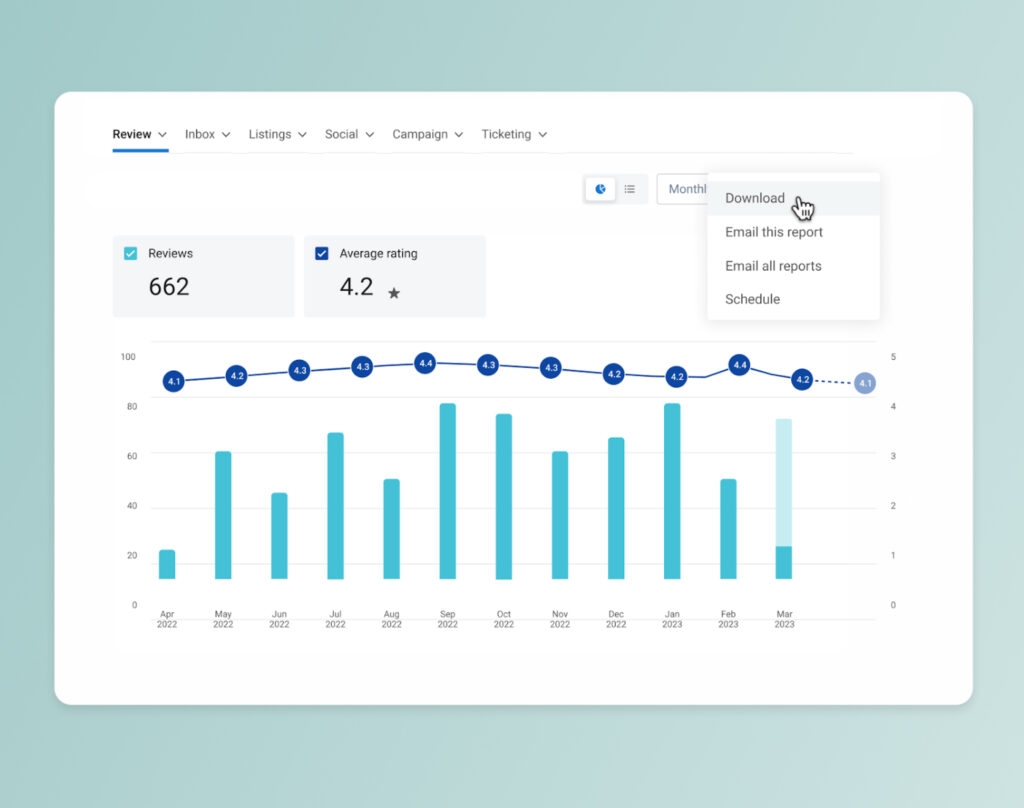
Once they adopted Birdeye GenAI tools, that changed dramatically:
- 8,000+ reviews (from just 60)
- 66,000+ patient survey responses
- Site-wide accuracy across Healthgrades, MD.com, Vitals, and more
- 5840% increase in map views
- 2390% increase in calls
- 1793% increase in web visits
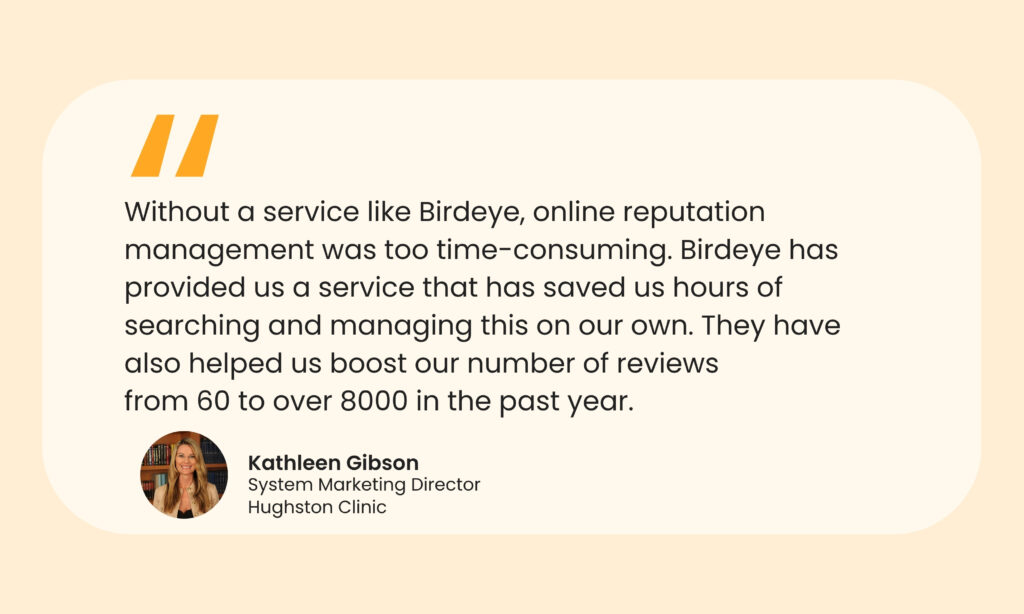
FAQs about healthcare marketing challenges
In 2026, the top challenges include earning patient trust, managing reviews at scale, ensuring HIPAA compliance, and aligning messaging across all healthcare services and digital channels.
Use tools that support centralized messaging and automation. When your organization chooses AI-based content generation with guardrails, you reduce inconsistencies and stay compliant.
Patients expect personalized, digital-first experiences. Static ads, disconnected tools, and outdated tactics can’t meet modern expectations or deliver measurable ROI.
AI platforms like Birdeye help you automate reviews, optimize listings, generate on-brand content, and surface insights, reducing manual work and enhancing decision-making.
Overcome healthcare marketing challenges with Birdeye
Today’s marketing teams don’t need more tools; they need smarter ones. Birdeye helps healthcare organizations solve their most pressing challenges by automating reviews, unifying communication, and uncovering real-time patient insights.
If your team is ready to improve visibility, streamline feedback, and deliver better experiences, Birdeye is built for you.
Originally published




